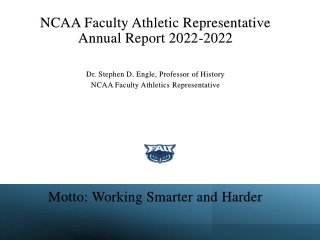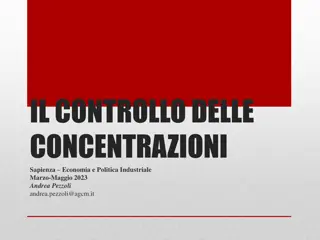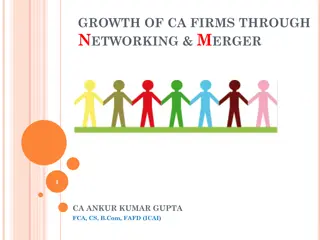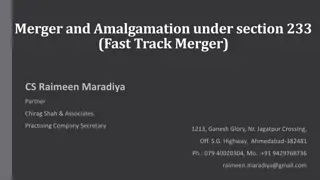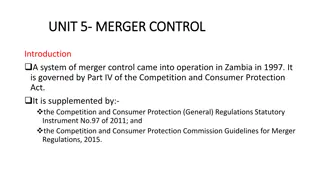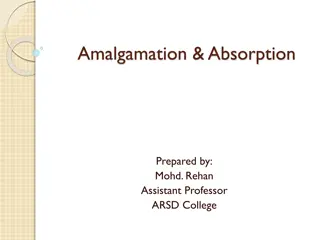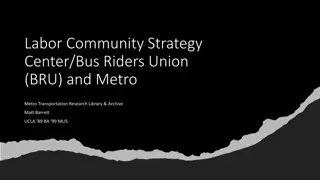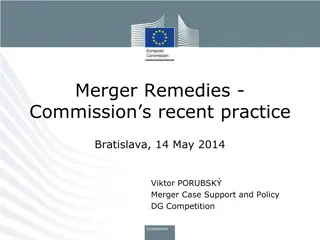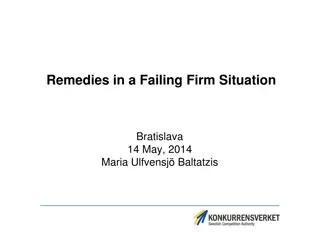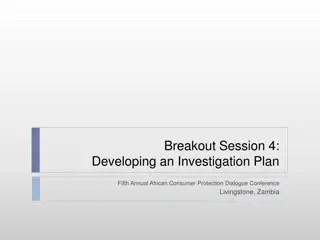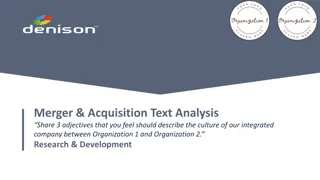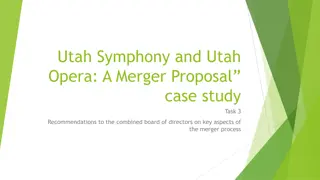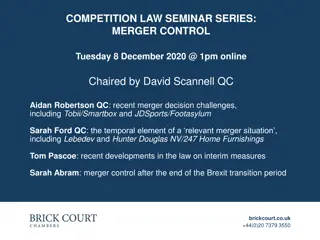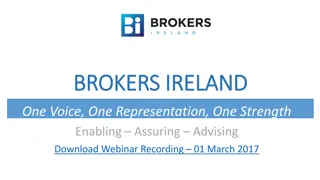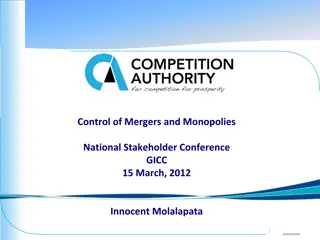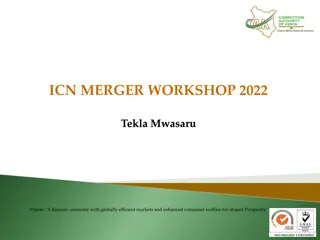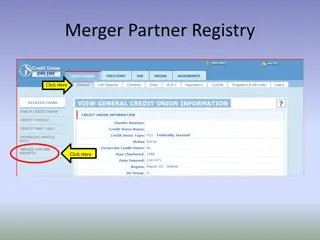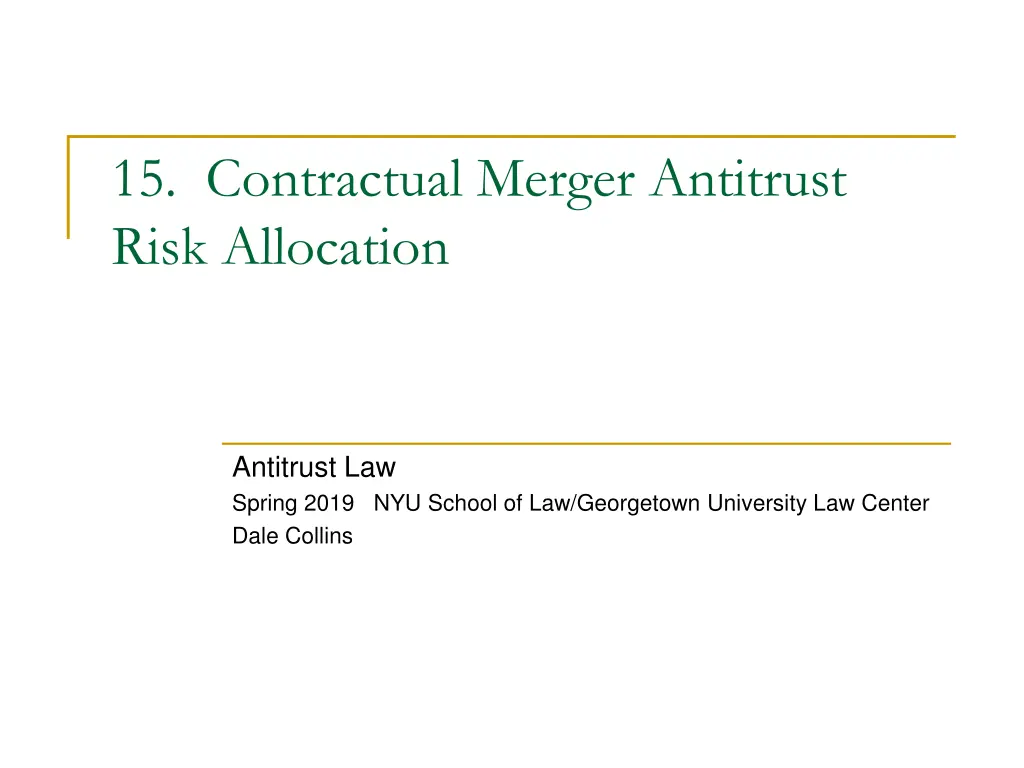
Antitrust Considerations in Merger Agreements
Explore key antitrust issues and considerations in merger agreements, including merger control filings, clearance disclosures, regulatory cooperation, litigation agreements, risk-shifting provisions, and more to navigate the complexities of antitrust law in mergers effectively.
Uploaded on | 2 Views
Download Presentation

Please find below an Image/Link to download the presentation.
The content on the website is provided AS IS for your information and personal use only. It may not be sold, licensed, or shared on other websites without obtaining consent from the author. If you encounter any issues during the download, it is possible that the publisher has removed the file from their server.
You are allowed to download the files provided on this website for personal or commercial use, subject to the condition that they are used lawfully. All files are the property of their respective owners.
The content on the website is provided AS IS for your information and personal use only. It may not be sold, licensed, or shared on other websites without obtaining consent from the author.
E N D
Presentation Transcript
15. Contractual Merger Antitrust Risk Allocation Antitrust Law Spring 2019 NYU School of Law/Georgetown University Law Center Dale Collins
Possible outcomes in DOJ/FTC reviews Waiting period terminates at the end of the statutory period with the agency taking enforcement action Agency grants early termination prior to normal expiration Close investigation DOJ: Seeks preliminary and permanent injunctive relief in federal district court FTC: Seeks preliminary injunctive relief in federal district court Seeks permanent injunctive relief in administrative trial Litigate Typical resolution for problematic mergers DOJ: Consent decree entered by federal district court FTC: Consent order entered by FTC in administrative proceeding Settle w/consent decree Parties will not settle at agency s ask and will not litigate Agency concludes that no settlement will resolve agency concerns (AT&T/T-Mobile, NASDAQ/NYSE Euronext) Parties terminate transaction Antitrust Law Spring 2019 NYU School of Law/Georgetown University Law Center Dale Collins 2
Antitrust considerations in merger agreements Key antitrust issues Relevant merger control filings Which merger clearances should be disclosed in reps and warranties? Which merger clearances should be closing conditions? Cooperation on regulatory matters Where and when to make merger filings? How much information sharing? Agreement on specific tactics and timing? Agreement to litigate any challenges to the acquisition? Antitrust risk-shifting provisions Settlement and divestiture commitments Reverse breakup fees Other payments Drop-dead date and termination provisions Why can either party terminate the merger agreement without cause? Does the merger agreement provide for enough time to defend the merger in the HSR review and, if necessary and desirable, in litigation? Antitrust Law Spring 2019 NYU School of Law/Georgetown University Law Center Dale Collins 3
Merger control filings Consents and approvals reps and warranties Merging parties typically represent that the execution of the agreement and consummation of the transaction will not require any consents and approvals except for compliance with the HSR Act or ECMR (if applicable) For other jurisdictions: Parties can identify in advance all other specific jurisdictions, but this requires significant due diligence and agreement up-front Parties typically refer to all applicable , all required foreign approvals or all necessary foreign approvals (generally understood as those with mandatory suspensory effect) May have a carve out for those foreign filings that would not have a material adverse effect if not obtained Antitrust Law Spring 2019 NYU School of Law/Georgetown University Law Center Dale Collins 4
Merger control filings Where do merger control filings need to be made? Over 100 jurisdictions have merger control filing requirements Most are mandatory and suspensory cannot close without filing and obtaining clearance A few are voluntary (e.g., U.K., Australia, New Zealand) A few are not suspensory (e.g., Indonesia) When do the merger filings have to be made? Two considerations Starting the clock as quickly as possible Allowing sufficient time for preparation of defense and customer contacts Which clearances will be incorporated in the closing conditions? Major jurisdictions almost always specifically identified Query: What if the closing conditions do not include clearance in a suspensory jurisdiction in which a filing is required? Antitrust Law Spring 2019 NYU School of Law/Georgetown University Law Center Dale Collins 5
Litigation closing condition Common formulation: No threatened or pending litigation Typically provides that no government action is pending or threatened that seeks to delay or prevent consummation of the transaction Question: What constitutes a threat of litigation? Question: What about private party actions? Alternative: No order If you can close, you must close Typically provides that no restraint, preliminary or permanent injunction or other order or prohibition preventing the consummation of the transaction shall be in effect Carve-out From a seller s perspective, may wish to have a carve-out that prior to asserting condition, the asserting party must be in compliance with its best efforts obligations (e.g., to settle or litigate) Antitrust Law Spring 2019 NYU School of Law/Georgetown University Law Center Dale Collins 6
Litigation covenant Are the parties committed to litigate in the event of an antitrust challenge? May be imposed on buyer alone or on both parties Obligation may be to litigate through to a final, non-appealable judgment, or something less Interactions with Any obligation to accept remedies in order to obtain clearance The drop-dead date Should the drop-dead date automatically be extended? Should the unilateral right to terminate be symmetrical? Antitrust Law Spring 2019 NYU School of Law/Georgetown University Law Center Dale Collins 7
Restructuring obligations Can arise in two provisions Efforts covenant Specific covenant to offer and accept remedies Antitrust Law Spring 2019 NYU School of Law/Georgetown University Law Center Dale Collins 8
Efforts covenant Sets standard for obligations to obtain antitrust clearances These covenants usually only provide vague parameters, but they do provide a general guide of what is expected from both parties Best efforts; Reasonable best efforts; Reasonable efforts; or Commercially reasonable efforts Decreasing level of required efforts Antitrust Law Spring 2019 NYU School of Law/Georgetown University Law Center Dale Collins 9
Efforts covenant Unqualified best efforts provision Usually taken to imply an obligation to offer or accept restructuring relief if necessary to obtain antitrust clearance Often coupled with express risk-shifting provision Reasonable best efforts / commercially reasonable best efforts Something less than best efforts/something more than reasonable efforts Most common formulation in antitrust covenants Obligation not well defined by courts Usually chosen precisely for this reason Conventional wisdom: Does not imply an obligation to offer or accept material restructuring relief to obtain antitrust clearance Can add express proviso to make explicit or limit obligation Reasonable efforts Generally regarded as imposing no obligations that would change the transaction or reduce the benefit of the deal to the buyer in any meaningful way Antitrust Law Spring 2019 NYU School of Law/Georgetown University Law Center Dale Collins 10
Specific covenant re remedies Range of alternatives Hell or high water provision Capped divestiture obligation Remain silent and rely on general efforts covenant Specifically exclude divestitures onerous on Buyer Decreasingly Unqualified hell or high water provision Requires seller to offer whatever remedy is necessary to obtain antitrust clearance Includes divestitures, licenses, behavioral undertakings, and hold separates Theoretically could require divestiture of entire target business HOHW provisions are not self-executing Agency still must agree to accept remedy In some deals, agency will not accept any consent decree (e.g., Staples/Office Depot, AT&T/T-Mobile, NASDAQ/NYSE Euronext) Antitrust Law Spring 2019 NYU School of Law/Georgetown University Law Center Dale Collins 11
Specific covenant re remedies Qualified remedies obligations Limited to certain business, product lines, or assets Limited by revenue, EBITDA or materiality cap Remain silent and rely on general efforts covenant Explicit no divestiture obligation Road map problem Informs agency of issues and remedies available for the asking Queries: Can the joint defense privilege or work product doctrine shield a risk-shifting provision from disclosure in an HSR filing or second request? Even if there are, are there disclosure obligations under applicable securities laws? Antitrust Law Spring 2019 NYU School of Law/Georgetown University Law Center Dale Collins 12
Litigation Are the parties committed to litigate in the event of an antitrust challenge? May be imposed on buyer alone or on both parties Obligation may be to litigate through to a final, non-appealable judgment, or something less Interaction of litigation provision with Any obligation to accept remedies to obtain clearance The more onerous the obligation, the more the buyer will want a credible threat to litigate The drop-dead date A litigation obligation (or right) is meaningless in the absence of time to litigate Should the drop-dead date automatically be extended? Should the unilateral right to terminate be symmetrical? Antitrust Law Spring 2019 NYU School of Law/Georgetown University Law Center Dale Collins 13
Antitrust-related payments Antitrust reverse termination fees Nonrefundable partial payments or deposits Ticking fees Take or pay obligation Antitrust Law Spring 2019 NYU School of Law/Georgetown University Law Center Dale Collins 14
Antitrust reverse termination fees Reverse breakup fee with an antitrust trigger Payable by the buyer to the seller where: the transaction does not close before the purchase agreement is terminated, and the only conditions not satisfied are the antitrust clearance conditions Historically relatively rare, but seeing more often in modern agreements Sellers usually negotiate some form of remedy obligation and/or higher purchase price to avoid reverse breakup fee Size of fee Varies widely Sample: January 1, 2015 January 31, 2018 417 transactions 66 with antitrust reverse termination fees (15.8%) Percentage of transaction value Largest: !2.5% Have been larger before 2015: 39.81% (Monsanto acquisition of Delta and Pine Land) Smallest: 0.6% Have been smaller before 2015: 0.11% (CapitalSource s proposed acquisition of TierOne) Mean: 4.7% Median: 4.4% Highest absolute dollar value $4.2 billion (AT&T s proposed acquisition of T-Mobile) (15.4%) Antitrust Law Spring 2019 NYU School of Law/Georgetown University Law Center Dale Collins 15
Antitrust reverse termination fees NB: The difference between the intervals is not uniform. Antitrust Law Spring 2019 NYU School of Law/Georgetown University Law Center Dale Collins 16
Antitrust reverse termination fees Recent examples Announcement Date Antitrust Reverse Breakup Fee Amount ($M) Acquiror Target Status Equity Value ($M) % of Equity Value 10/18/2018 Novartis AG Endocyte, Inc. Completed $1,202.89 $150 12.5% 4/29/2018 T-Mobile US, Inc. Sprint Corp. Pending $26,513.01 $53,895.83 $600.00 2.3% 3/8/2018 Cigna Express Scripts Completed $2,100 3.9% $54,721.78 $67,822.82 12/14/2017 Walt Disney Twenty-First Century Fox Completed $2,500 4.6% 12/3/2017 CVS Health Aetna Completed $2,100 3.1% 11/3/2016 AAM MPG Completed $1,453.98 $101.79 7.0% 10/31/2016 General Electric Baker Hughes Abandoned $35,900.00 $3,800.00 $1,300.00 3.6% 4/28/2016 Comcast Corp. Dreamworks Animation Completed $200 .00 5.3% $736.46 3/4/2016 AMC Entertainment Carmike Cinemas Completed $50.00 6.8% $9,416.39 10/27/2015 Walgreens Boots Alliance Rite Aid Abandoned $325.00 3.5% $17,139.75 10/21/2015 7/3/2015 Western Digital Corp. Aetna SanDisk Humana Completed Blocked $1,060.42 $1,000.00 6.2% $34,088.24 2.9% 6/20/2015 Anthem Cigna Blocked $47,215.57 $1,850.00 3.9% 2/12/2015 Expedia Orbitz Worldwide Completed $1,329.58 $115.00 8.6% 2/4/2015 Staples Office Depot Blocked $6,205.61 $250.00 4.0% 11/17/2014 Halliburton Baker Hughes Abandoned $34,600.00 $3,500.00 10.1% 11/17/2014 Actavis Allergan Completed $67,365.83 $2,100.00 3.1% 8/1/2014 Scientific Games Bally Technologies Completed $3,194.97 $105.00 3.3% 7/28/2014 Zillow Trulia Completed $2,631.48 $150.00 5.7% 2/20/2014 Brookdale Senior Living Emeritus Completed $1,380.13 $143.00 10.4% 1/28/2014 12/8/2013 3/20/2011 Martin Marietta MaterialsTexas Industries Sysco AT&T Completed Blocked Abandoned $2,059.29 $3,500.00 $39,000.00 $140.00 $300.00 $4,200.00 6.8% 8.6% 10.8% US Foods (p) T-Mobile USA Antitrust Law Spring 2019 NYU School of Law/Georgetown University Law Center Dale Collins 17
Payments Ticking fees Require buyer to pay interest on purchase price if transaction not closed by particular date Aim to motivate buyer to obtain regulatory clearances quickly Relatively rare in public transactions Dow Chemical/Rohm and Hass: 5% of equity value Boston Scientific/Guidant: 3% of equity value Nonrefundable partial payments Like a ticking fee but requires more than the payment of interest Payable on a specified schedule Take or pay clauses Antitrust Law Spring 2019 NYU School of Law/Georgetown University Law Center Dale Collins 18
Cooperation covenants Specifies level of cooperation by parties in obtaining antitrust clearances Typical requirements Advance notice and review of communications and submissions with agency Right to attend meetings/conferences with agency Subject to agreement by agency Right to review 4(c) and second request documents Party interests Buyer usually want to control process and not have seller operating independently with governmental authorities Seller wants to know what is going on to ensure buyer is fulfilling efforts obligations Both want to maximize knowledge of the evidence submitted to the agency Antitrust Law Spring 2019 NYU School of Law/Georgetown University Law Center Dale Collins 19
Timing provisions Timing for filings Often as promptly as possible But some delay (5-10 business days) may be desirable to permit: Indepth substantive analysis Customer rollout Coordination in submitting required merger filings Other timing-related provisions Provisions agreeing not to withdraw filings, extend waiting periods or enter into timing agreement without consent of other party Seller may want to impose a specific deadline on second request compliance Antitrust Law Spring 2019 NYU School of Law/Georgetown University Law Center Dale Collins 20
Timing and termination Drop-dead date Typical: One year from signing Does it provide long enough for expected approvals and litigation? One year should be enough in most cases Can include an extension (often +120 days) in the event of a second request or Phase II investigation Can add further extension (often 3 months + 3 months) to permit litigation of a preliminary injunction (but does not permit an appeal) MAC clause: If business likely to deteriorate significantly during a prolonged antitrust review, may need provisions to ensure MAC is not used to avoid any divestiture commitments or avoid payment of reverse breakup fees Antitrust Law Spring 2019 NYU School of Law/Georgetown University Law Center Dale Collins 21
Risk-shifting summary Buyer-friendly Seller-friendly Level of efforts Commercially reasonable efforts Reasonable best efforts Best efforts Obligation to make divestitures Silent/expressly excluded Divestitures up to cap measured in asset or revenue terms or MAC applying to part or all of acquired or merged business Obligation to make any and all divestitures necessary to gain clearance no matter how much or what impact is (HOHW) Timing for other aspects of regulatory review Silent/may be deadline for submission of HSR filing Silent/may be deadline for submission of HSR filing Express timing for submission of filing, Second Request compliance and other milestones Timing for offering divestitures Silent Silent Express timing for offering remedies to obtain clearance Control of regulatory process Buyer controls; require cooperation from Seller and may give access and information Buyer leads; Seller entitled to be present at meetings, calls; obligation on Buyer to communicate certain matters to Seller Full involvement of Buyer in negotiations with regulators; Seller prohibited from communicating without Buyer (except as required by law) Obligation to litigate Silent/expressly exclude/litigate at buyer s option Silent/expressly exclude Obligation to litigate if regulators block exercisable at seller s option; does not relieve buyer of obligations to make divestitures Termination provisions Open-ended, extendable at buyer s option Tolling at either party s option Tolling at seller s option Reverse break-up fee None Possible Substantial fee; provision for interim payments and interest Time to termination date As long as buyer anticipates needing to fully defend transaction on merits, plus ability to extend at buyer s option Tolling at either party s option Tolling at seller s option at specified inflection points (e.g., second rquest compliance, commencement of litigation) None None Requires payment of full purchase price by termination date even if transaction cannot close Take or pay provision Antitrust Law Spring 2019 NYU School of Law/Georgetown University Law Center Dale Collins 22
SUMMARY Antitrust Law Spring 2019 NYU School of Law/Georgetown University Law Center Dale Collins 23
Summary: Will the deal close? The framework for assessing a horizontal transaction Market here means any identifiable subset of customers that purchase from one or both of the merging parties (not a Merger Guidelines relevant market) What markets should be analyzed? Ultimate question: Will customers likely be harmed in prices, quality, or innovation? Are the parties head-to-head competitors? How many other realistic alternative sources of supply? Are the parties uniquely close competitors? Is one of the merging parties a maverick ? Is one of the merging parties a potential entrant? Will there be significant customer complaints? Are there bad documents? What markets will be challenged? Ultimate question: Can the threat to customers be eliminated through a divestiture? Can the problematic markets be fixed? What businesses or assets need to be divested to solve the antitrust problem? Are additional assets necessary to make the divestiture assets separable from the business? Are additional assets necessary to make the divestiture assets saleable? Are there buyers acceptable to the reviewing agency? Will the agency require a single buyer for all divestiture assets? What is the loss of value (including lost synergies) due to the divestiture(s)? What contractual protection can be obtained to ensure against a bad deal? Important but not critical: How long will all of this take? Is the deal still worthwhile? Antitrust Law Spring 2019 NYU School of Law/Georgetown University Law Center Dale Collins 24

